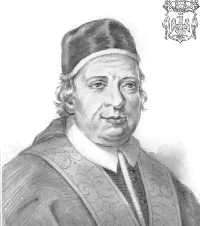 The election of Michelangelo de' Conti aroused nostalgic memories of the Middle Ages, for Michelangelo was of the same family which had produced three thirteenth-century popes: Innocent III, Gregory IX, and Alexander IV. Yet the very circumstances of the election showed how wide was the chasm which separated the politically powerful papacy of Innocent III from the badgered papacy of Innocent XIII. The favorite in the conclave had been Cardinal Paolucci, the late Pope's secretary of state; but when his election seemed near, Cardinal Althan in the name of Emperor Charles VI declared him excluded. Then the cardinals turned to Michelangelo de' Conti, who took the name Innocent XIII.
The election of Michelangelo de' Conti aroused nostalgic memories of the Middle Ages, for Michelangelo was of the same family which had produced three thirteenth-century popes: Innocent III, Gregory IX, and Alexander IV. Yet the very circumstances of the election showed how wide was the chasm which separated the politically powerful papacy of Innocent III from the badgered papacy of Innocent XIII. The favorite in the conclave had been Cardinal Paolucci, the late Pope's secretary of state; but when his election seemed near, Cardinal Althan in the name of Emperor Charles VI declared him excluded. Then the cardinals turned to Michelangelo de' Conti, who took the name Innocent XIII.
Michelangelo de' Conti was born May 13, 1655, in the family's ancestral castle at Poli. He studied first with his uncle, the bishop of Ancona, and then with the Jesuits at the Roman College. In the papal service he rose to be governor of Ascoli, Frosinone, and Viterbo. In 1695 he was sent as nuncio to Switzerland and made titular archbishop of Tarsus. From 1698 to 1709 he served as papal ambassador to Portugal, where he won the esteem of Lisbon court. In 1706 he was made a cardinal. After his return from Portugal he became bishop of Osimo, and later was given the see of Viterbo. Sickness compelled him to resign his see in 1719.
A stout old gentleman of sixty-six, Innocent XIII was known for his blameless life, his ability, and his strong sense of dignity. This sense of dignity added to ill health tended to make the Pope somewhat hard to see. But if officials and envoys found Innocent difficult, the poor discovered in him a father.
Innocent XIII granted the investiture of Naples Sicily to Emperor Charles VI, but his kindness was not rewarded. The Hapsburgs continued to encroach on ecclesiastical rights, refused to restore Comacchio, and ignored the Pope's rights in Parma.
The irrepressible Jansenists hoped that Innocent would not be as firm against them as had been Clement XI. They were disappointed. Innocent insisted on submission to the bull Unigenitus. Though he met with much insubordination in France, the old Pope stood firm. Even worse was the situation in Holland, where stubborn Jansenists got themselves a bishop and revolted from the Pope. To this day a small Jansenist sect exists in Holland.
The sore problem of the Chinese rites remained to vex Innocent. The Pope misled by a volley of attacks on the Jesuits, actually threatened to forbid the order to receive novices. The Jesuit General Michelangelo Tamburini, however, presented a convincing defense; but before Innocent could act on the matter he was dead. Meanwhile the Church in China reeled under persecution.
Never well, Innocent was attacked by dropsy in February 1724. On March 7 Innocent XIII died.
Excerpted from "Popes
Through the Ages" by Joseph Brusher, S.J.

